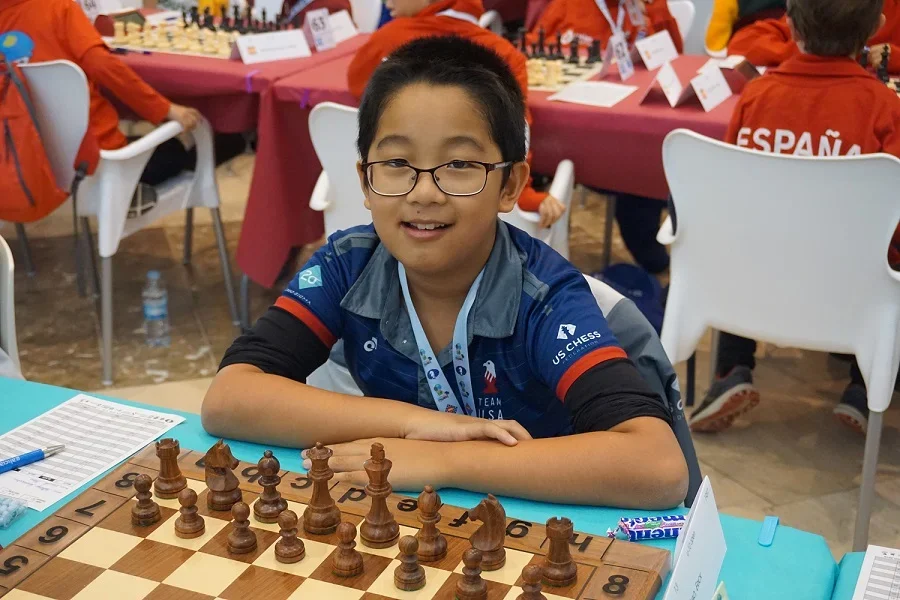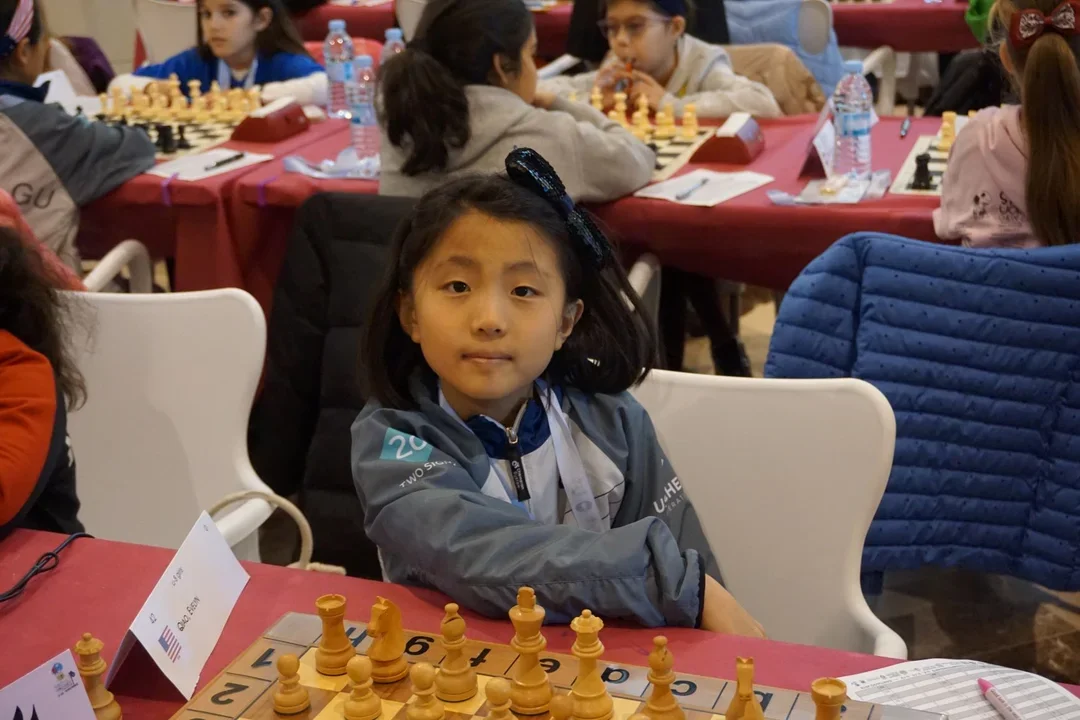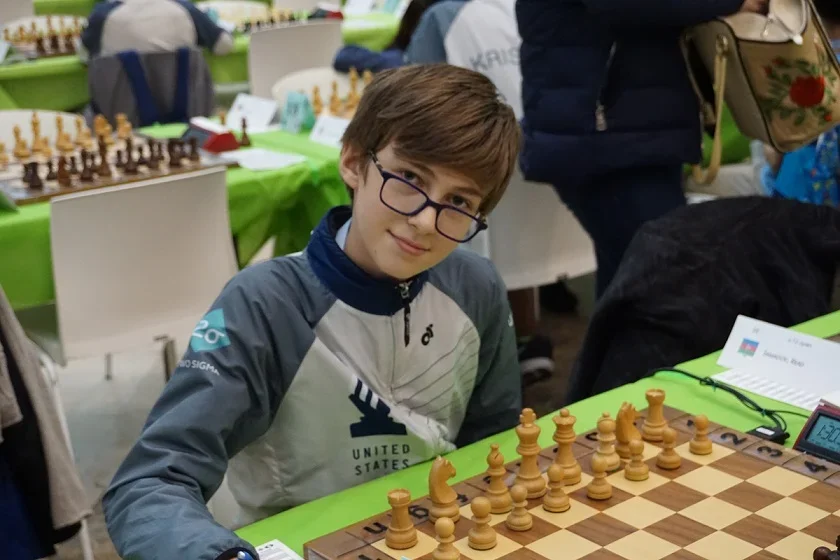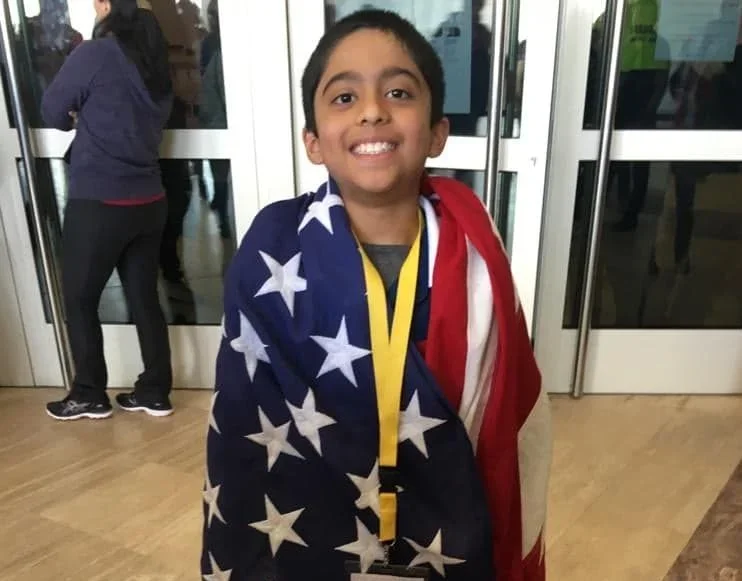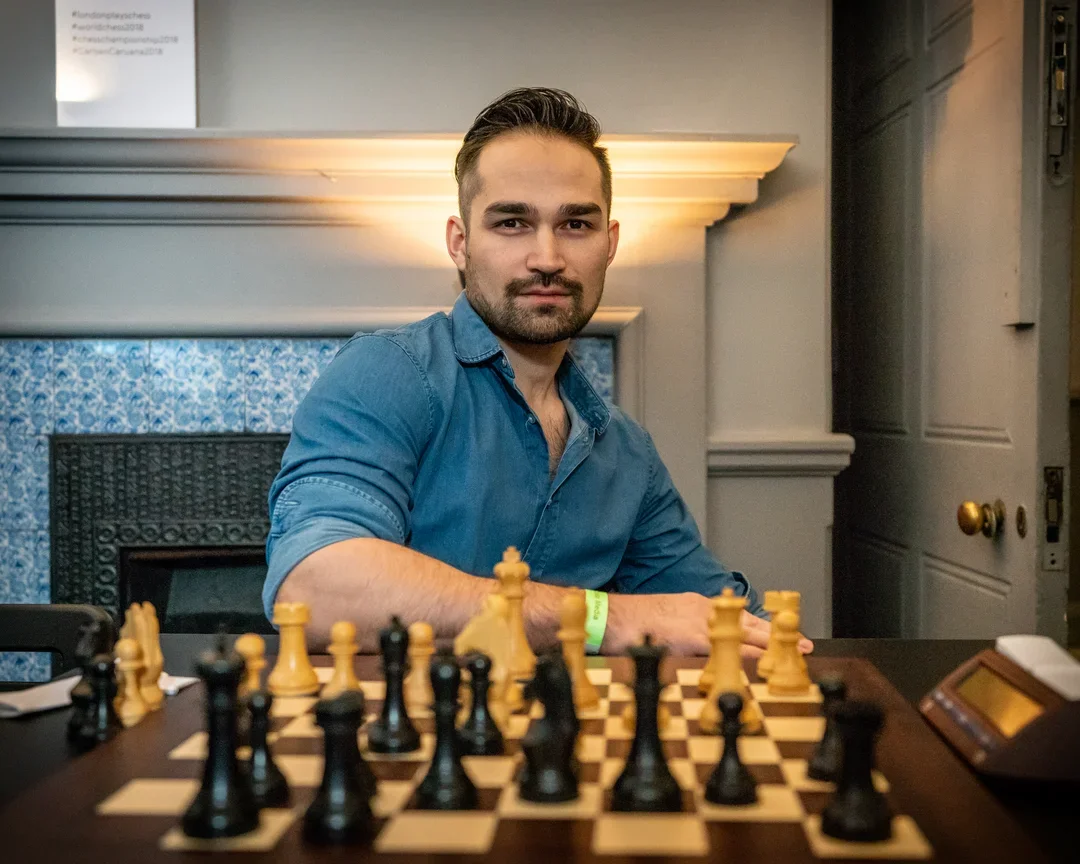I got the call to work as a coach for the U.S. National Youth Team back in August, my second time this year and again to my great delight, as it’s long been a serious goal of mine to work with top juniors in international tournaments. The 2018 World Cadet Championships took place November 4-15 in Santiago, Spain, and coincided perfectly with the Carlsen – Caruana World Championship match in London during November. So naturally after the World Cadet was finished I hopped on a plane over to London to witness some chess history in the making. Here’s my recap of both events: SANTIAGO As reported before, the U.S. team earned four medals from the six individual sections of the World Cadet Championships, which included Open U8, U10, U12 and Girls U8, U10, U12. With 30 official players, each of the coaches, IM Armen Ambartsoumian, IM Andranik Matikozyan, GM Robert Hungaski, GM Alex Lenderman and myself were assigned six players each to work with for the event. The 11-round tournament took pace at one round per day, which offered ample time to prep with each student before the round. The starting time of 4pm, however, felt a bit late for a youth event, as late-finishing games would finish past the bedtime of a lot of kids, leaving little time to eat dinner and go over the game as one would like. One of the many reasonable gripes we had with the official organization! The rest of the team included the Head of Delegation, Aviv Friedman, who basically oversaw every organizational aspect in Spain, making sure the players, coaches, and parents were given the best chance to succeed and making sure to keep the organizers as accountable as possible (there were a lot of mishaps, but I won’t get into it here as the large U.S. delegation was treated much better than other teams). Aiding Aviv was Grant Oen, who helped with any issues that came up, took many great photos, and contributed timely updates to US Chess during the event. Also integral were Pete Karagianis of US Chess, who organized many aspects of the trip from back home and Noah Chasin, who served as the parent coordinator, an important role when it came to mass communication. Our full delegation was about 75 players, but our top star was undoubtedly gold medalist Raj Chennareddy, who took first place in the Open Under 8 with 10.5/11, winning his first nine (!) games in the process. I was tasked to work with Raj on-site after being contacted by his main coach back home, GM Mesgen Amanov, who recently wrote a wonderful article about his experience training Raj right from the start.
I really enjoyed my time coaching Raj during the World Cadet. Many talented players are lazy about learning their opening lines, or studying the opening in general. Not Raj. It was pretty clear early on that he was a hard-worker with a good memory and an excellent attitude towards chess. His earlier games were a bit easy, but starting from Round 3 they were all tough, and he had to work quite a bit for every point, showing his incredible fighting spirit by continuing to look for chances in equal positions. His game from Round 7 stood out in this regard—after outplaying his opponent to reach a winning rook endgame, Raj’s technique slipped and he couldn’t figure out how to win three pawns up, eventually allowing his opponent to reach a drawn position. With 6/6, we all expected Raj to offer a draw and go home, but he kept pressing and after over 100 moves of play his opponent made a grave error and Raj was able to finally convert:
[pgn] [Event "U8 World Cadet Championship"] [Date "2018.11.11"] [White "Chennareddy, Yuvraj"] [Black "Golovchenko, Bogdan"] [Result "1-0"] [ECO "B31"] [WhiteElo "1497"] [BlackElo "1556"] [Annotator "Kostya"] [SetUp "1"] [FEN "2k5/2P4R/8/2K5/2P5/8/8/3r4 b - - 0 99"] [PlyCount "12"] [EventDate "2018.??.??"] [SourceVersionDate "2018.11.04"] [WhiteTeam "United States"] [BlackTeam "Russia"] [WhiteTeamCountry "USA"] [BlackTeamCountry "RUS"] {[#]} 99... Rc1 $2 {After many moves of great defense, Black makes a crucial misstep with the rook.} (99... Rg1 {would hold the draw, Philidor style} 100. Kb5 Rg6 101. c5 Rf6 $11) 100. Kd6 $1 Kb7 (100... Rd1+ 101. Kc6 $18 {and Black really needs his rook to be able to give a decent check, but it can't.}) 101. Rh5 $1 {The only winning move, preparing to build a bridge on the 5th rank.} Kc8 (101... Rd1+ {would lose after} 102. Rd5 Rxd5+ 103. cxd5 Kc8 104. Ke7 $18) (101... Rxc4 102. Rb5+ Ka6 103. Rb8 $18) 102. Rh8+ Kb7 103. c8=Q+ Kb6 104. Qc7+ Ka6 105. Ra8# 1-0[/pgn]
By winning his next two games, Raj just needed a draw to clinch the title in the 10th round. He made it, by the skin of his teeth against a determined opponent who couldn’t stop playing quickly in a winning position. Now when a player clinches a tournament with a round to spare, it’s quite hard, psychologically, to stay motivated for the last game, which now counts for very little. But Raj kept his head, stayed focused, and won with ease, reaching a truly dominating 10.5/11 against the field. For an eight-year-old, Raj showed true mental strength throughout the event. Raj’s mom, Prathima, also deserves a lot of credit—she made sure Raj ate well and napped before every game. With the rounds starting later in the day, it was of real importance that players showed up well-rested and properly energized! I believe the daily rhythm preparation and rest allowed Raj to settle into a nice groove for each round. Also with an excellent performance was Erick Zhao, who was not one of the official players but instead worked with his own coach remotely, and performed excellently to tie for first in the Open Under 10 with 9/11, taking second place and the silver medal on tiebreaks. Erick was very close to earning the gold himself—after winning the last round, it took a late round blunder in order for Jin Yueheng of China to win and catch up to Erick, earning gold based on a better tiebreak. Since winning silver, Erick capped off 2018 with another great result, sweeping the 4th grade Championship in December in Orlando, Florida. A cool video was posted recently about Erick’s coach and training methods via Chessable: https://www.youtube.com/watch?v=kQ3DikdwbfA Our other two winners were bronze medalists Evelyn Qiao (Girls Under 8) and FM Nico Chasin (Open Under 12). Neither of these players were favored to win their sections, but both maintained great form, especially in the second half of the event, to snag third place. Evelyn Qiao came into the event as an unrated player and drew her first game against another unrated player, Yunqing Zhao of China. She then won her next game but lost in Round 3 to one of the favorites in the section, Veronica Iudina of Russia. 1.5/3 doesn’t seem like such a great start but it sounds a lot better when you find out that Evelyn’s opponents, Zhao and Iudina, ended up taking first and second place overall! Evelyn went on to score 7/8 in the rest of the tournament to earn clear third place, which included a nice win as Black over another strong player: [pgn] [Event "Girls U8 World Cadet Championship"] [White "Zubkovskaya, Ekaterina"] [Black "Qiao, Evelyn"] [Result "0-1"] [ECO "C41"] [WhiteElo "1377"] [Annotator "Kostya"] [SetUp "1"] [FEN "2brrbk1/ppq3p1/n1p4p/4P1n1/1P1p2P1/P5NP/N1PBR1B1/R2Q3K b - - 0 24"] [PlyCount "25"] [EventDate "2018.??.??"] [WhiteTeam "Belarus"] [BlackTeam "United States"] [WhiteTeamCountry "BLR"] [BlackTeamCountry "USA"] {[#]} 24... d3 $1 {A powerful pawn break activating the rook from d8.} 25. cxd3 Rxd3 26. Ne4 $2 {Under huge pressure, White starts faltering here.} ({White's best was} 26. Nh5 {where Black would have to find the accurate} Qf7 $1 { in order to keep the intiative. After} 27. Qc2 {Black has a strong exchange sacrifice in} Rxh3+ $1 28. Bxh3 Nxh3 $17 {where White's position collapses on the light-squares.}) 26... Nxe4 27. Bxe4 $2 {Another slip, forgetting about the h3-pawn.} ({After} 27. Rxe4 Red8 28. Re2 {White is holding on but Black has a number of strong options, including simple moves like Be6 and greedier moves like} Rxa3 $1 $19 {where White has nothing to show for the pawn.}) 27... Rxh3+ 28. Kg1 Bxg4 {Now it's all over, Black's pieces are too powerful.} 29. Qf1 Bxe2 30. Qxh3 Qxe5 31. Re1 Qxe4 32. Nc3 Qg6+ 33. Kh1 Bc4 34. Rg1 Bd5+ 35. Nxd5 Qe4+ 36. Rg2 cxd5 {and Black soon won.} 0-1[/pgn]
Nico Chasin had a similarly tough schedule in the Open Under 12—after starting with 4/4, he was then paired with FM Christopher Yoo, the 2nd seed in their section. Nico traded the queens early on and took the game into an endgame where he could play for two results—and after a few mistakes by Christopher, Nico was able to take advantage and collect the full point. With 5/5 Nico earned himself a pairing with the top seed and rising star, IM Gukesh D, who won their game and looked fairly unstoppable in Santiago, eventually securing gold with 10/11. But this turned out to be just a minor setback for Nico, who continued confidently, scoring 3.5 in his final five games, including this interesting encounter with another strong player, FM Sebastian Kostolansky (Slovakia): [pgn] [Event "U12 World Cadet Championship"] [Date "2018.11.11"] [White "Kostolansky, Sebastian Lukas"] [Black "Chasin, Nico"] [Result "0-1"] [ECO "B80"] [WhiteElo "2323"] [BlackElo "2189"] [Annotator "Kostya"] [SetUp "1"] [FEN "3r1rk1/7p/3P2pR/2n3P1/1p2p3/pP3qN1/P1P5/1K1RQ3 w - - 0 32"] [PlyCount "20"] [EventDate "2018.??.??"] [WhiteTeam "Slovakia"] [BlackTeam "United States"] [WhiteTeamCountry "SVK"] [BlackTeamCountry "USA"] {[#]} 32. Ne2 $2 {This turns out to be the losing mistake.} (32. Rh1 $1 { was absolutely needed, getting the rook back into play with Rf1 next. The position is complicated but Stockfish seems to like White.}) 32... e3 $1 { Clearing a fantastic e4-square for Black's knight.} 33. Nd4 Qg4 {Keeping an eye on the rook on d1.} 34. Qh1 Ne4 $1 {Threatening Nc3+ and Qxd1.} 35. Nc6 ({ White's not in time with} 35. Rxh7 {in view of} Nc3+ {followed by Qxd1+ next.}) 35... Nc3+ 36. Kc1 (36. Ka1 Qxd1+ 37. Qxd1 Nxd1 38. Nxd8 Rf1 $1 $19 {and White gets mated.}) 36... Nxa2+ 37. Kb1 Nc3+ 38. Kc1 Qxd1+ {Simplifying into an easily won endgame.} 39. Qxd1 Nxd1 40. Nxd8 Rxd8 41. Kxd1 a2 0-1[/pgn]
After this win, Nico ended up with 8.5/11, tying for second place with three other players, including fellow American IM Arthur Guo. The tiebreaks remained unclear for a while but eventually it was official: Arthur finished in fourth, Nico took third, and FM Volodar Murzin (Russia) finished second. Coaching such young players is no easy task, and I’ve gained a lot of respect for trainers who do this full-time. In addition to needing deep chess knowledge and the ability to pass it on, a coach has to manage the emotional swings of the player very carefully—too much excitement after a win can lead to laziness in the next game, while after a bad loss a player often needs a bit of positive reinforcement to restore their confidence for the next day. To encourage mental stability, I tried to remind my students that regardless of their performance, they were going to gain a ton of valuable chess experience just by virtue of putting in their maximum effort in each game.
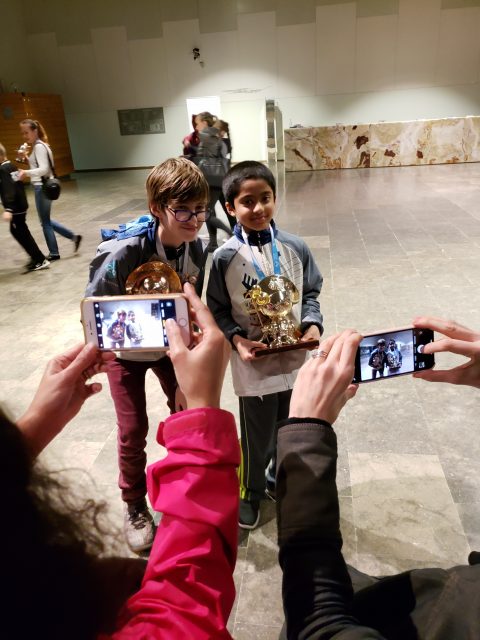 Nico and Raj post-awards ceremony, Photo Kostya Kavutskiy
Nico and Raj post-awards ceremony, Photo Kostya KavutskiyLONDON After the World Cadet Championships finished, my schedule allowed me to head to London for a couple of days, where I managed to catch Rounds 7 and 8 of the Carlsen – Caruana World Championship Match. This was my first time seeing a world championship take place in person, so I really tried to take in as much as possible. My ‘spectator experience’ was cool--I enjoyed watching the players live, and even witnessed some dramatic moments from the viewer hall. I also had a lot of fun simply following the match online, and tweeting about it too! There was so many places to watch good coverage that the best place to follow all aspects of the match was Twitter, where the highlights of each stream would quickly be posted/shared, giving the spectator a real-time view of not just the game but also what everyone thought about the game as it progressed! After the exciting Round 8, I was in town for another day and got a chance to participate in a fun blitz tournament hosted by Chessable + IM John Bartholomew. The format was quite unique: the players were divided up into groups and each given a mask of either Carlsen or Caruana. I thought the point was to play a blitz event where you couldn’t see your opponent’s face, but that idea was quickly abandoned by players who wanted to see the board. I ended up winning my section, qualifying for a knockout playoff against the other section winners. I won my quarterfinal and semifinal match (the time control was 2+0), but lost against John Bartholomew in the final, landing me second place!
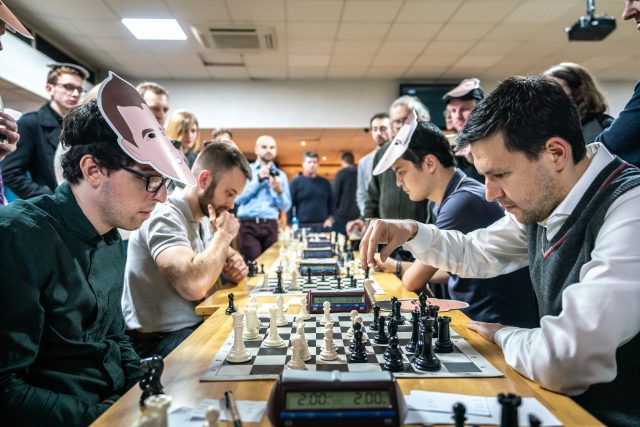 The semifinals: Kostya vs. IM Bogdan Vioreanu; IM John Bartholomew vs. GM David Howell in the background (Photo: Eric Rosen)
The semifinals: Kostya vs. IM Bogdan Vioreanu; IM John Bartholomew vs. GM David Howell in the background (Photo: Eric Rosen)Overall, my experience in London was tremendous. I got to meet a lot of new faces, as well as run into some Americans that I hadn’t seen in years, who were also visiting London to root for Caruana. The day after the Chessable blitz event, I flew back to my hometown of Los Angeles, just in time for Thanksgiving and to catch the rest of that incredible match. Next up, I’ll be playing the Bay Area International and Gibraltar Masters, both taking place in January of next year. Time to put some of that World Championship experience to good use, so wish me luck! IM Kostya Kavutskiy is a professional chess player, coach, and writer, and can be found active on Twitter. Also make sure to check out his Patreon page for instructive chess analysis and advice for improvement.
Categories
Archives
- January 2026 (9)
- December 2025 (27)
- November 2025 (29)
- October 2025 (39)
- September 2025 (27)
- August 2025 (29)
- July 2025 (43)
- June 2025 (25)
- May 2025 (24)
- April 2025 (29)
- March 2025 (29)
- February 2025 (20)
- January 2025 (24)
- December 2024 (34)
- November 2024 (18)
- October 2024 (35)
- September 2024 (23)
- August 2024 (27)
- July 2024 (44)
- June 2024 (27)
- May 2024 (31)
- April 2024 (51)
- March 2024 (34)
- February 2024 (25)
- January 2024 (26)
- December 2023 (29)
- November 2023 (26)
- October 2023 (37)
- September 2023 (27)
- August 2023 (37)
- July 2023 (47)
- June 2023 (33)
- May 2023 (37)
- April 2023 (45)
- March 2023 (37)
- February 2023 (28)
- January 2023 (31)
- December 2022 (23)
- November 2022 (32)
- October 2022 (31)
- September 2022 (19)
- August 2022 (39)
- July 2022 (32)
- June 2022 (35)
- May 2022 (21)
- April 2022 (31)
- March 2022 (33)
- February 2022 (21)
- January 2022 (27)
- December 2021 (36)
- November 2021 (34)
- October 2021 (25)
- September 2021 (25)
- August 2021 (41)
- July 2021 (36)
- June 2021 (29)
- May 2021 (29)
- April 2021 (31)
- March 2021 (33)
- February 2021 (28)
- January 2021 (29)
- December 2020 (38)
- November 2020 (40)
- October 2020 (41)
- September 2020 (35)
- August 2020 (38)
- July 2020 (36)
- June 2020 (46)
- May 2020 (42)
- April 2020 (37)
- March 2020 (60)
- February 2020 (38)
- January 2020 (45)
- December 2019 (34)
- November 2019 (35)
- October 2019 (42)
- September 2019 (45)
- August 2019 (56)
- July 2019 (44)
- June 2019 (35)
- May 2019 (40)
- April 2019 (48)
- March 2019 (61)
- February 2019 (39)
- January 2019 (30)
- December 2018 (29)
- November 2018 (51)
- October 2018 (45)
- September 2018 (29)
- August 2018 (49)
- July 2018 (35)
- June 2018 (31)
- May 2018 (39)
- April 2018 (31)
- March 2018 (26)
- February 2018 (33)
- January 2018 (30)
- December 2017 (26)
- November 2017 (24)
- October 2017 (30)
- September 2017 (30)
- August 2017 (31)
- July 2017 (28)
- June 2017 (32)
- May 2017 (26)
- April 2017 (37)
- March 2017 (28)
- February 2017 (30)
- January 2017 (27)
- December 2016 (29)
- November 2016 (24)
- October 2016 (32)
- September 2016 (31)
- August 2016 (27)
- July 2016 (24)
- June 2016 (26)
- May 2016 (19)
- April 2016 (30)
- March 2016 (36)
- February 2016 (28)
- January 2016 (32)
- December 2015 (26)
- November 2015 (23)
- October 2015 (16)
- September 2015 (28)
- August 2015 (28)
- July 2015 (6)
- June 2015 (1)
- May 2015 (2)
- April 2015 (1)
- February 2015 (3)
- January 2015 (1)
- December 2014 (1)
- July 2010 (1)
- October 1991 (1)
- August 1989 (1)
- January 1988 (1)
- December 1983 (1)


